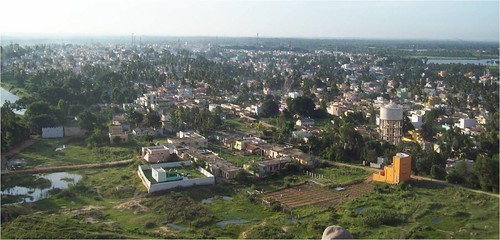Sanitation and Hygiene
Toilets in the making: Delhi Urban Art Commission (DUAC) designs eco friendly and low cost public toilets for Delhi
Posted on 01 Mar, 2013 02:06 PM

Water in India: Situation and prospects: Book release by UNICEF, FAO and SaciWaters
Posted on 26 Feb, 2013 06:13 PMThe report released at UNDP, New Delhi on February 14, 2013 attempts to consolidate the significant amounts of information available on water and sanitation in India and also aims to examine the key current challenges in the sector; both the threats and opportunities for the water sector in India.
Dr Aidan Cronin, Water, Sanitation and Hygiene Specialist, UNICEF gives a sneak preview to the report
Video courtesy: UNICEF
Subsidy or shame: Which technique works better in improving sanitation in India ? - Talk by Sumeet Patil, NEERMAN, at the 3ie seminar at Delhi, February 2013
Posted on 25 Feb, 2013 09:48 AMSubsidy proponents believe that the poor need economic incentives while shaming proponents contend that to bring out lasting behavioural change, intrinsic motivation is required; people are more likely to use and value things they have had to pay for.
Strategies for achieving environmental sustainability in rural development - A report by United Nations Development Programme
Posted on 23 Feb, 2013 10:22 AMThis report by the United Nations Development Programme (UNDP) presents strategies for inclusive rural development embodying the principles of environmental sustainability. It recommends measures needed to achieve green, including measuring and tracking, the use incentives and the building of capacities. It also contains a number of case studies showing how green results can be achieved.
Anthropogenic activities leads to deterioration of groundwater quality: A study of Mayyanad and Edamulakkal panchayats of Kollam district in Kerala
Posted on 22 Feb, 2013 10:07 AMKerala is a rain blessed state in the country. It has highest number of wells, when compared with other states. However due to its slanting topography there is significant decline in the ground water levels leading to severe water scarcity during summer months in most districts of the state. Further over extraction and dependence of groundwater for domestic use from the dug wells especially in rural pockets has resulted in several groundwater problems. In this backdrop the paper in The Ecosan- An International Quarterly Journal of Environmental Science, sheds light on groundwater quality issues in two panchayats of Kerala.
Assessing the land use change and its impact on water resources: A study on the Mula and Mutha rivers catchment area in Pune
Posted on 17 Feb, 2013 09:11 PMLand use changes hydrologic system and have potentially large impacts on water resources. An assessment in an area with seasonally limited water availability and which is subject to rapid socio- economic development and population growth will provide an exemplary view on the local impacts of major recent developments in India. In this backdrop this paper analyzes past land use changes between 1989 and 2009 and their impacts on the water balance in the Mula and Mutha Rivers catchment upstream of Pune. The aim of the paper is:
- assess the land use changes between 1989/1990 and 2009/2010
- analyze the impacts of these changes on the long-term water balance components in the Mula and Mutha Rivers catchment upstream of the city of Pune.
The role of sanitation in girl child education - A documentary film by HEEALS
Posted on 15 Feb, 2013 08:31 PM
The role of sanitation in girl child education - A documentary film by HEEALS
HEEALS is a vibrant civil society organization that aims to safeguard health, environment, education and livelihood to promote sustainable development of society. Through the medium of documentary film and art it is trying to create awareness among the masses about girl child education, menstrual hygiene, sanitation and safe drinking water and attempting to relate how girl child education directly suffers due to bad sanitation facilities, unsafe drinking water and lack of knowledge to obtain the same.
Influence of anthropogenic contamination on fluoride concentration in groundwater: A study of Mulbagal town, Kolar district, Karnataka
Posted on 15 Feb, 2013 04:53 PMGroundwater contamination is a serious, but relatively ignored issue in the country. This contamination occurs in either through geogenic or anthropogenic means. Fluoride contamination is one such example of geogenic contamination that is widely found in the Kolar district of Karnataka. However, the fluoride levels in the town of Mulbagal are lower than those in the surroundings. Earlier, a study was conducted on the impact of pit toilets on the groundwater in the area. The present paper investigates the presence of any link between these two phenomena.
Population Services International is looking for a General Manager for WASH technical support for their project on supporting sustainable sanitation improvements in Bihar'
Posted on 14 Feb, 2013 01:24 PMPatna, Bihar
About Population Services International
Population Services International is a registered Indian Society dedicated to the improvement of public health in India. PSIIndia’s mission is to empower the people ofIndia to lead healthy lives. What started as a small operation in 1988 has now spread to 22 State andUnionTerritories inIndia. Over the past twenty years, PSI has collaborated with the GoI and a number of donors to increase the use of modern contraception for family planning, to provide products and services for the health of mothers and children and to decrease the spread of HIV/AIDS.
Supporting Sustainable Sanitation Improvements in Bihar
PSI is currently implementing an ambitious 5 year project 3Si – Supporting Sustainable Sanitation Improvements in Biharthrough supply side strengthening, with funding from the BMGF. This project aims to catalyze private sector response to constructing over 500,000 toilets in 8 districts of Bihar.






